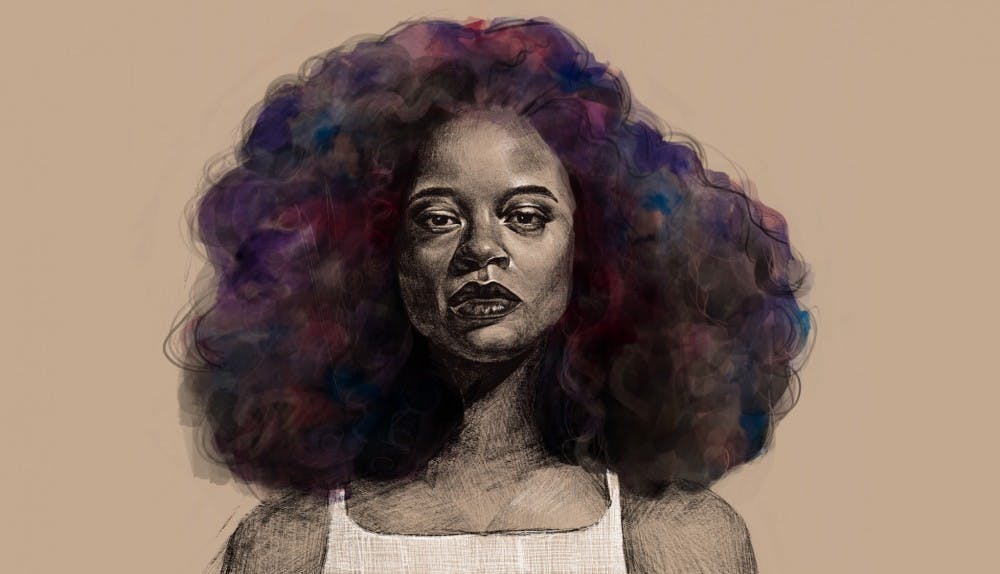The world was first introduced to British singer–songwriter Ella Mai upon the release of her debut commercial single, the breezy summer anthem “Boo’d Up”. As the first UK artist to top the US R&B charts since 1992, her style of pop–inflected R&B sung over snare–heavy trap beats proved infectious to everyone. Signed to DJ Mustard’s label after being discovered on Instagram, Mai’s three previous EPs contain songs asserting her confidence and desire, all while nodding to '90s R&B musical traditions lyrically and musically. While her previous songs sound more similar than different, Ella Mai’s eponymous debut album was highly awaited by fans.
However, despite all its hype, Ella Mai leaves much to be desired. Upon first listen, it’s clear that the album doesn’t deserve its length, stretching to 16 songs. While every track is instinctually easy to jam along to, only a few are memorable. The album was executive–produced by DJ Mustard, who infuses each song with the same melodic “hip–pop” sound and not much else. Many, like “Dangerous” or “Cheap Shot”, offer nothing new in terms of instrumentation, nor do they showcase Mai’s underlying vocal talent. In fact, the primary fault of this album is that it all just sounds the same—a squandered opportunity for someone as charming and with as much inherent aptitude for songwriting as Ella Mai.
The album is interspersed with spoken interludes playing off of concepts and the letters in Mai’s name—for example, E for emotion, L for lust, L for love, etc. While interludes are often key to developing the theme of an album, in Ella Mai they feel forced, trite, or as Pitchfork puts it, like “vague Hallmark-isms.” The spoken–word piece at the end of “Shot Clock” (“L—Love...full of chuckles and cuddles and sometimes eye puddles”) is especially cringeworthy.
Granted, Ella Mai has several highlights. Its singles—“Boo’d Up,” “Trip,” and the bonus track “Naked” are incredibly well put–together, emotional songs. Opening up with a beautiful piano melody repeated throughout the track, “Trip"'s soulful melody and haunting lyrics allow Mai’s talents to stand out. Catchy, memorable, and rhythmic, “Trip” is one of the best songs on the album, if not in recent R&B music. “Naked” is cathartic; Mai singing over pure guitar riffs provides a welcome change from trap beats. Promoting body positivity, self–esteem, and empowerment, “Naked” reframes baring oneself within a context of self–love, not typical seduction. It’s a shame Ella Mai includes songs like “Naked” alongside songs like “Whatchamacallit,” featuring Chris Brown. While “Whatchamacallit” is musically one of the most lively, earworm–worthy songs on the album, Mai’s collaboration with a known abuser raises questions about her complicity with his actions and cheapens her message of female empowerment found throughout the tracklist. While her lyrics may be pro–woman, her actions betray her.
Other songs on the album are also artistically successful. “Sauce,” especially its chorus, is radio–friendly urban contemporary music at its finest. With its stripped–down verses and mixing of two unique voices, “Everything,” featuring John Legend, is refreshing and soulful. “Gut Feeling,” featuring H.E.R., is reverberating and lamenting (“But the more we touch, the more it starts killin' me”), while “Run My Mouth” is a gritty R&B–trap song that strays from Mai’s usual style. The songs that work on Ella Mai let her vocal ability shine. But, when the production overwhelms her crooning, the songs turn into tracks any R&B artist could sing.
Overall, Ella Mai is a perfectly decent album. But its lack of focus and lackluster production mean that Mai’s inner musical gifts we know she’s capable of delivering have to be actively sought out. The album would benefit from some variety, in both its production as well as in the thematic content. So listen to Ella Mai and keep on the lookout for her next singles, but beyond a couple of standouts, don’t expect anything too innovative.

